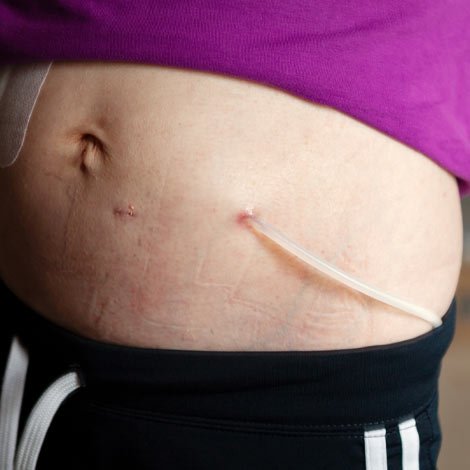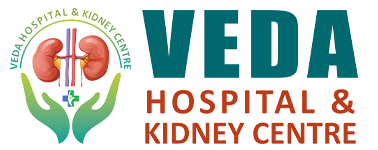Peritoneal dialysis in Vijayawada
What is Peritoneal Dialysis?
Peritoneal dialysis is a life-saving treatment option for individuals with chronic kidney failure. It is an alternative to hemodialysis and uses the lining of the abdominal cavity, called the peritoneum, to filter waste products and excess fluids from the blood. This method offers flexibility, independence, and a better quality of life for many kidney failure patients.
Understanding How Peritoneal Dialysis Works
In peritoneal dialysis, a cleansing fluid known as dialysate is introduced into the abdominal cavity through a catheter. This fluid absorbs waste products and extra fluids from the blood vessels in the peritoneal lining. After a specific dwell time, the fluid is drained out of the abdomen, carrying with it the toxins and waste.

Types of Peritoneal Dialysis
- Continuous Ambulatory Peritoneal Dialysis (CAPD): This method does not require a machine. The patient manually performs the exchanges four to five times a day.
- Automated Peritoneal Dialysis (APD): This type uses a machine called a cycler to perform multiple exchanges during the night while the patient sleeps.
Who Needs Peritoneal Dialysis?
Peritoneal dialysis is recommended for individuals with advanced chronic kidney disease (CKD) or end-stage renal disease (ESRD). Patients who want to manage their dialysis from home, maintain a flexible lifestyle, or who have vascular access issues may benefit greatly from this method. Dr. M.V. Viswanath, an expert Kidney Failure Treatment Doctor in Vijayawada, evaluates patients thoroughly before recommending peritoneal dialysis.
Benefits of Peritoneal Dialysis
- Convenience of home treatment
- Fewer dietary restrictions
- Continuous toxin removal, avoiding drastic body changes
- Improved blood pressure control
- Greater patient independence
Risks and Complications
While peritoneal dialysis is generally safe, potential risks include:
- Peritonitis (infection of the peritoneum)
- Hernia due to increased abdominal pressure
- Weight gain from glucose in dialysate
- Catheter-related infections
With proper training and hygiene practices, most of these risks can be minimized. At Veda Hospital & Kidney Centre, known as a leading Peritoneal Dialysis Hospital in Vijayawada, patients receive personalized care and support to manage these risks effectively.
Peritoneal Dialysis Procedure at Veda Hospital
At Veda Hospital & Kidney Centre, each patient undergoes a comprehensive evaluation to determine suitability for peritoneal dialysis. The process includes:
- Insertion of a soft catheter into the abdomen through a minor surgical procedure
- Education and training on how to perform exchanges safely at home
- Regular follow-ups to monitor progress, infection control, and kidney function
Dr. M.V. Viswanath and his team offer extensive support and guidance to ensure a safe and smooth transition to home-based dialysis therapy.
Why Choose Peritoneal Dialysis?
Unlike hemodialysis, which requires visits to a dialysis center three times a week, peritoneal dialysis offers the freedom to manage your treatment in the comfort of your home. This is particularly beneficial for working individuals, students, and travelers. Dr. M.V. Viswanath, a trusted Kidney Failure Treatment Doctor in Vijayawada, often recommends peritoneal dialysis for its lifestyle adaptability and consistent toxin removal benefits.
Cost and Accessibility
Peritoneal dialysis is cost-effective compared to center-based hemodialysis in the long term. At Veda Hospital & Kidney Centre, packages are customized to meet patient needs. The team ensures that patients receive adequate training, materials, and emergency care access whenever necessary.
Diet and Lifestyle Changes
Although peritoneal dialysis allows for more dietary freedom, patients should still:
- Monitor fluid intake
- Reduce sodium and phosphorus-rich foods
- Maintain healthy protein intake
- Stay active and maintain good hygiene during exchanges
Role of Dr. M.V. Viswanath in Kidney Care
Dr. M.V. Viswanath is a leading nephrologist with vast experience in treating kidney failure cases. As a dedicated Kidney Failure Treatment Doctor in Vijayawada, he emphasizes a patient-centric approach. His work at Veda Hospital & Kidney Centre has transformed the lives of many patients seeking a comprehensive dialysis treatment plan tailored to their unique needs.
Why Veda Hospital & Kidney Centre?
- State-of-the-art facilities for peritoneal dialysis
- Skilled nephrologists and trained dialysis nurses
- Patient training programs for home dialysis
- 24/7 support and emergency care
- Trusted name as a top Peritoneal Dialysis Hospital in Vijayawada
Frequently Asked Questions (FAQs)
How often should peritoneal dialysis be performed?
CAPD is typically performed 4 times a day, while APD is done overnight using a cycler. Your doctor will recommend the best schedule based on your health.
Is peritoneal dialysis painful?
No, the process is generally painless. You may feel slight discomfort during fluid exchanges initially, which usually subsides over time.
Can I travel while on peritoneal dialysis?
Yes, one of the main advantages of peritoneal dialysis is flexibility. With proper planning and supplies, traveling is very much possible.
Can I do peritoneal dialysis at home by myself?
Yes, after adequate training provided by Veda Hospital's dialysis team, you can safely perform the procedure at home.
What is the success rate of peritoneal dialysis?
With proper care and hygiene, peritoneal dialysis has excellent success rates in managing end-stage renal disease effectively over the long term.
What are signs of infection in peritoneal dialysis?
Fever, abdominal pain, cloudy fluid, or redness at the catheter site may indicate infection. Immediate medical attention is needed.
Will I still need to take medications during peritoneal dialysis?
Yes, medications such as phosphate binders, vitamins, and sometimes blood pressure drugs may be necessary as part of your treatment plan.
How is the catheter placed for peritoneal dialysis?
A soft catheter is surgically placed into your abdomen through a minor procedure under local or general anesthesia.
How long can a person stay on peritoneal dialysis?
Many patients stay on peritoneal dialysis for years. However, long-term use depends on individual health and peritoneal membrane function.
Peritoneal dialysis is a reliable and flexible option for managing kidney failure. With expert guidance from Dr. M.V. Viswanath and the facilities at Veda Hospital & Kidney Centre, patients in Vijayawada have access to top-tier kidney care. Whether you're seeking a Kidney Failure Treatment Doctor in Vijayawada or a trusted Peritoneal Dialysis Hospital in Vijayawada, your journey to better health begins here. Schedule a consultation today to understand the best dialysis option for you.
Best healthcare providers

Unmatched Nursing Support

Top-notch Patient Care

Hospitable environment

Phenomenal intervention

